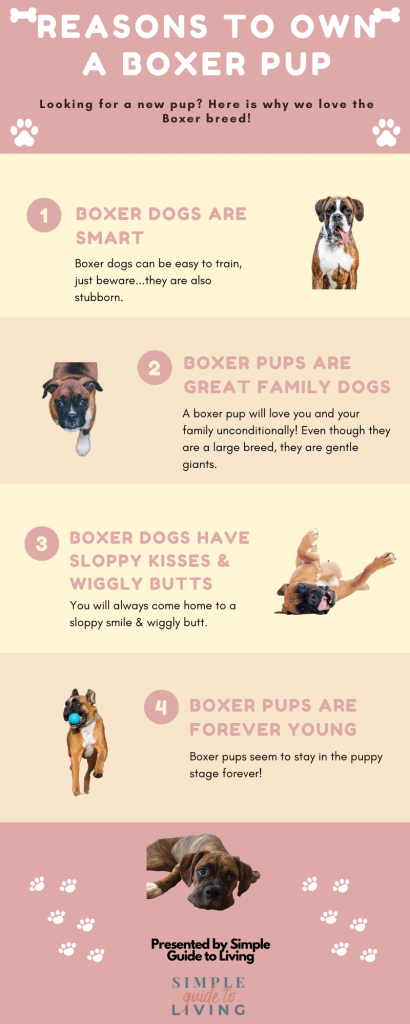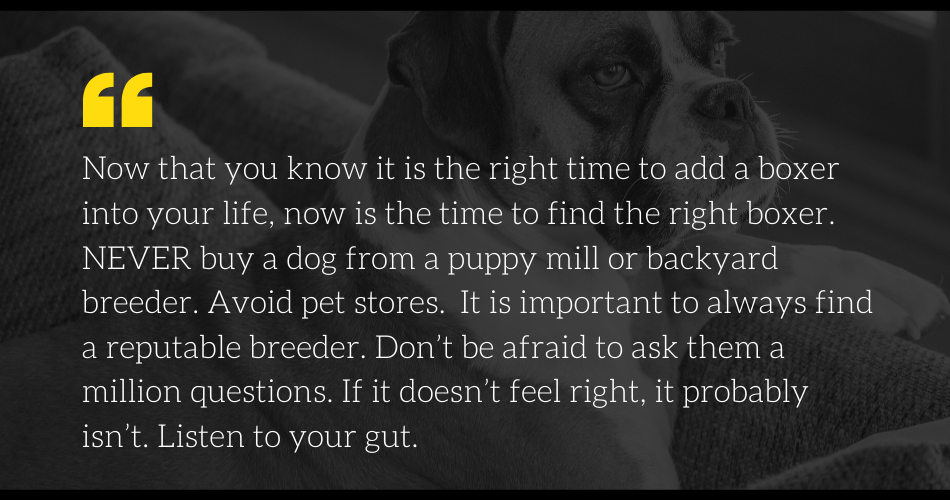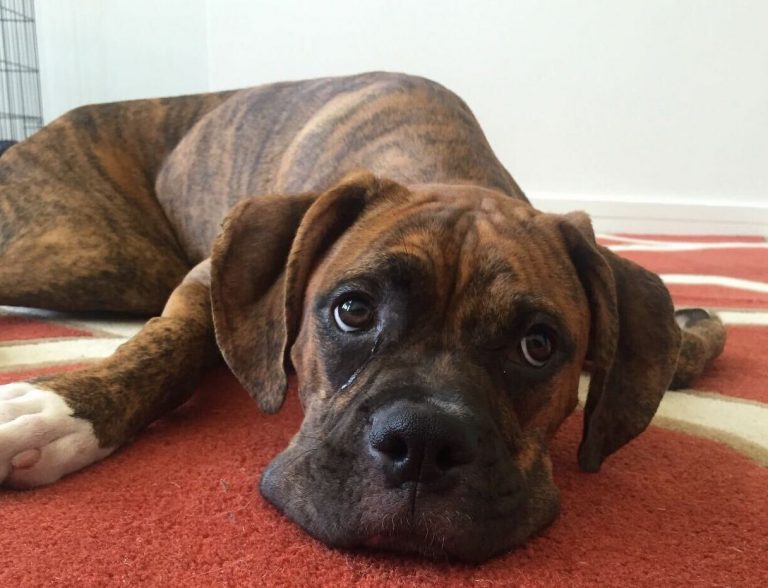Boxers are one of the most beloved dog breeds. And I can see why. After meeting two very special boxer dogs, Rally and Penelope, I have officially become a Boxer lover.
If you have been thinking about getting a Boxer puppy, you are in for a treat. Boxer dogs are NOT your ordinary big dog. And you will soon learn why.
We are here to help you on your journey to finding your new furry friend. Especially if you are thinking of getting a Boxer pup for the first time, this boxer training guide will help you get on the right foot.

Quick Things To Know About Boxer Dogs
There are a few things you need to be ready for when owning a boxer puppy…first off, be prepared for lots of slobber and sloppy kisses. Also, wiggly butts, underbites, overbites, and a snaggletooth or two. Boxer dogs are expressive, they will show their personality in their face, ALL THE TIME. You may also find an eye and nose booger every once in a while.
Most people think that Boxer puppies outgrow their puppy hood in just a year, but that is the farthest from the truth. Most dogs are in the puppy stage for the first 2 to 3 years of their life. But with the Boxer breed, they maintain their puppy spirit pretty much their whole life. Boxer dogs think they are lap dogs, so they love to smother you with love.
Boxer pups are very STRONG. Meaning they tend to have docked tails. And because of their size, there are some hereditary issues that are common. The Boxer breed also tend to suffer from hip issues, so be prepared for that.
Yes, Boxer dogs are very Independent, but deep down, they are still very needy.
Do Your Research on the Boxer Breed
Talk to other Boxer dog owners. Stroll the dog park or if you see one at the pet store, don’t be afraid to ask for advice. Most dog owners LOVE to talk about their pet, especially those with Boxer pups.
You also have to take the time to do your own research. If you don’t have time to do this, you will not have time to take care of a puppy. You need to find out many things to know if you are ready for a Boxer.
We will save you some time and dig into a little bit about the Boxer breed.
History of the Boxer Breed
The Boxer breed first originated in Germany. They were bred by an Old English Bulldog & the now extinct Bullenbeisser.
Boxer dogs are considered medium to large dogs and have short, smooth hair. Their colors can vary, but most are either fawn, brindled or white. If you are lucky, you will get a boxer with special white marketing around the face or around the feet, which we like to call socks!
Female Boxer pups tend to range from 55 to 65 pounds and males usually grow up to 70 pounds. But you should take this information lightly. My god dog, Penelope, is close to 75 pounds. However, Penny is also no average Boxer, she just has more to love!
Boxer dogs are very strong dogs with a square muzzle. The life expectancy of a Boxer range from 10 to 12 years, but don’t be fooled. Most Boxers act like puppies until the very end.

The AKC currently ranks the Boxer breed as the 11th most popular dog breed, but they are clearly number one in our eyes.
They are full of personality and very playful. Boxer pups are devoted, intelligent, cheerful, energetic, fearless, loyal, brave, friendly and confident. They will grow very close to their owners, especially children and the family as a whole. They have the instinct to be a guardian and always want to keep their family safe. Need proper socialization but great with kids to play with them and guard them. Oftentimes called nanny dogs for a reason.
Does a Boxer Dog fit in your life?
There are a few things you need to consider and ask yourself before you dive in and get a dog, especially a Boxer. Dogs are a big responsibility and need to be treated like family. Make sure your current lifestyle and the timing is right.
- Do you have time for a large and strong dog?
- Do you know how to potty train a puppy?
- Are you financially able to care for your puppy? (Think about vet bills, grooming bills, and food bills)
- Will a puppy fit into your lifestyle? (For example, do you travel a lot? If you do, do you have someone who can carry for your puppy while you are gone?)
- Do you have the time and commitment to walk your puppy every single day?
- Is your home safe for a puppy? (Do you have an area for the puppy to potty?)
- Will a dog fit into your family and get along with other members of the family, including other four-legged friends?
Finding the Right Boxer Pup
Now that you know it is the right time to add a boxer pup into your life, now is the time to find the right boxer. NEVER buy a dog from a puppy mill or backyard breeder and try to avoid pet stores. It is important to always find a reputable Boxer breeder. Don’t be afraid to ask them a million questions. If it doesn’t feel right, it probably isn’t. Just listen to your gut.
- Do they belong to any clubs such as the American Kennel Club or the American Boxer Club?
- What do they do with their dogs when they are not breeding?
- How often do the females get pregnant and how many litters have they had?
- Have the puppies been to the vet and received any vaccinations yet?
- Do they have any known health issues?
- Can you see the puppies first?
- What is the process of bringing them home?
- Do they offer a warranty if their puppies fall ill for no fault of the owner?
What to get your Boxer Pup in Training
You want to make sure you are prepared for your puppy when you bring it home! So there are a few things you need to have ready for them.
Metal Crates – dogs are den animals by nature so they want to find comfort in a warm place, especially to sleep or hide. For a Boxer, the bigger the crate the better, they will grow fast and you want to keep the crate around as their safe place.
Puppy Food – it is always best to start on the food that was given to them from the breeder. Then you can switch over slowly if you want to change it up after speaking to your vet. Penelope tends to like Canidae best!
Food & water bowl – of course your pup needs a bowl for their food and water. For a Boxer, we recommend the big gulp water fountain. This holds plenty of water because boxers LOVE to drink their water!
Potty training items – pee pads, urine cleaner, and poop bags
Harness – your Boxer will outgrow a harness, but this is great to have when they are a puppy for training purposes. Then you might want to move to a shock collar to help even more with training when they get super strong and stubborn.
Toys – teething toys to start out, but beware that Boxers are strong, even as puppies. They will destroy a lot of toys that are not tough enough. The classic tire is always a hit and surprisingly, so is a laser pointer.
Dog bed – remember, your puppy is going to grow, quickly. Make sure you get a bed that will be big enough for your puppy as they grow. Costco and Amazon always have great and durable dog beds.
Doggie lawn – a doggie lawn is a patch of grass that can be used for your pup to potty on. It is a nice way to potty train your puppy and is perfect for apartment patios.
Boxer Puppy Training Tips
I never would have thought that you could raise a big dog like a Boxer pup in a condo, but it is possible! Yes, it is always ideal to have a large yard for your Boxer dog. But if you live in a condo, you just need to be creative. Go for long walks every single day and make the time to take your Boxer pup to the park to get out their energy. This is where a doggie lawn comes in handy for potty training. Remember, if there is a will, there is a way! Don’t forget to reward your pup with homemade dog treats.
There are a few things you should get your Boxer puppy used to at a young age. Car rides are definitely something you want your Boxer dog to enjoy and be excited about. Take your Boxer pup on rides around the town to get them used to the feeling!
Of course, training in general needs to be started at a young age as well. The goal is to raise a healthy, happy, and an obedient Boxer pup, like Penelope! No one likes a neurotic ball of energy. Working with a local Boxer puppy training class or a training to find the best training technique for your Boxer pup.
Boxers will need their toenails trimmed often, so you want to get them in the habit of that at an early age as well. Once cleared by the vet, make sure to take your Boxer pup to a groomer to get their toes trimmed consistently.
While your Boxer puppy is growing, continue to get them out to play and once they have all of their vaccines, socialize with other dogs and people. Also, stimulate their mind with fun toys and always reward them when they do something good, especially during potty training!
We do have to cover some things you NEVER want to do when raising your Boxer puppy. Never leave your Boxer puppy alone, especially cooped up, for more than 6 hours at a time. Avoid overfeeding them, as it can cause health issues. Also, don’t let them be around other dogs until they are fully vaccinated. This is why you should follow up with your vet for the proper vaccinations.
Consistency is key. The good news is that the Boxer breed is very smart and Boxer pups always want to please their owners. However, they do get distracted easily. Start inside with less commotion and gradually work your way up to outdoors. Where there are birds…rabbits and new plants, all tempting distractions for your Boxer dog.
With patience and love, you will grow an incredible bond with your Boxer. And you will be proud that your gentle giant has such good manners!
Need more Boxer pups in your life? Check out our favorite Boxer dog Instagrams!



